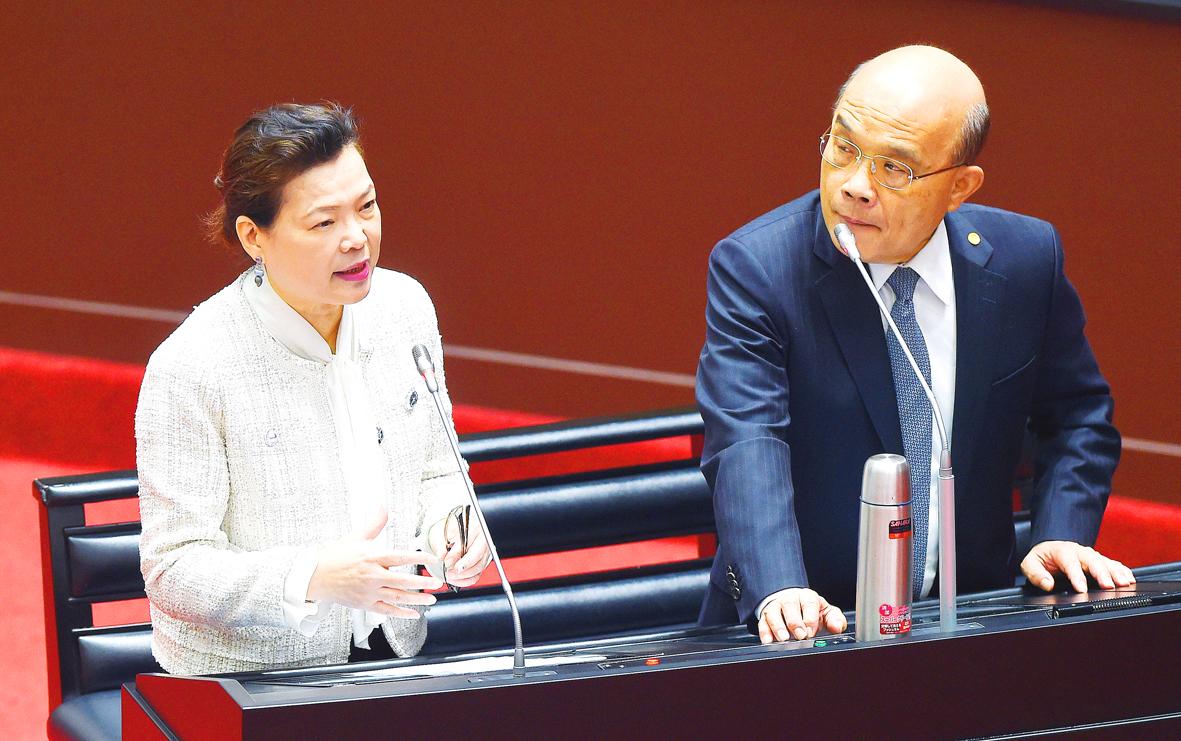The government’s two-week ban on Indonesian migrant workers is expected to affect 1,350 workers, including 300 to 400 manufacturing jobs, with most of the rest being domestic caregivers, Minister of Economic Affairs Wang Mei-hua (王美花) said yesterday.
“About 70 percent of migrant workers from Indonesia work as caregivers,” Wang said. “The Ministry of Economic Affairs (MOEA) and the Council of Labor Affairs will work with businesses to resolve any urgent staffing problems caused by the temporary ban.”
The main industries affected by the ban are metalworking and food processing, she said.

Photo: Liao Cheng-hui, Taipei Times
Firms who find themselves understaffed due to the ban have three possible solutions, Wang said.
“The council can match companies with local Taiwanese workers; they can find migrant workers from Vietnam, Thailand or the Philippines; or they can extend the visas of their current workers,” Wang said.
Most migrants working in local manufacturing come from Vietnam and the Philippines, followed by those from Indonesia, she added.
“This is a short-term problem,” Wang said.
The Central Epidemic Command Center on Monday announced a two-week ban on travel from Indonesia from Friday, due to a spike in arrivals from Indonesia infected with COVID-19.
The status of the COVID-19 situation in Indonesia would determine whether the ban is partially lifted at the end of the two weeks, said Minister of Health and Welfare Chen Shih-chung (陳時中), who heads the center.

Sweeping policy changes under US Secretary of Health and Human Services Robert F. Kennedy Jr are having a chilling effect on vaccine makers as anti-vaccine rhetoric has turned into concrete changes in inoculation schedules and recommendations, investors and executives said. The administration of US President Donald Trump has in the past year upended vaccine recommendations, with the country last month ending its longstanding guidance that all children receive inoculations against flu, hepatitis A and other diseases. The unprecedented changes have led to diminished vaccine usage, hurt the investment case for some biotechs, and created a drag that would likely dent revenues and

Global semiconductor stocks advanced yesterday, as comments by Nvidia Corp chief executive officer Jensen Huang (黃仁勳) at Davos, Switzerland, helped reinforce investor enthusiasm for artificial intelligence (AI). Samsung Electronics Co gained as much as 5 percent to an all-time high, helping drive South Korea’s benchmark KOSPI above 5,000 for the first time. That came after the Philadelphia Semiconductor Index rose more than 3 percent to a fresh record on Wednesday, with a boost from Nvidia. The gains came amid broad risk-on trade after US President Donald Trump withdrew his threat of tariffs on some European nations over backing for Greenland. Huang further

CULPRITS: Factors that affected the slip included falling global crude oil prices, wait-and-see consumer attitudes due to US tariffs and a different Lunar New Year holiday schedule Taiwan’s retail sales ended a nine-year growth streak last year, slipping 0.2 percent from a year earlier as uncertainty over US tariff policies affected demand for durable goods, data released on Friday by the Ministry of Economic Affairs showed. Last year’s retail sales totaled NT$4.84 trillion (US$153.27 billion), down about NT$9.5 billion, or 0.2 percent, from 2024. Despite the decline, the figure was still the second-highest annual sales total on record. Ministry statistics department deputy head Chen Yu-fang (陳玉芳) said sales of cars, motorcycles and related products, which accounted for 17.4 percent of total retail rales last year, fell NT$68.1 billion, or

Macronix International Co (旺宏), the world’s biggest NOR flash memory supplier, yesterday said it would spend NT$22 billion (US$699.1 million) on capacity expansion this year to increase its production of mid-to-low-density memory chips as the world’s major memorychip suppliers are phasing out the market. The company said its planned capital expenditures are about 11 times higher than the NT$1.8 billion it spent on new facilities and equipment last year. A majority of this year’s outlay would be allocated to step up capacity of multi-level cell (MLC) NAND flash memory chips, which are used in embedded multimedia cards (eMMC), a managed